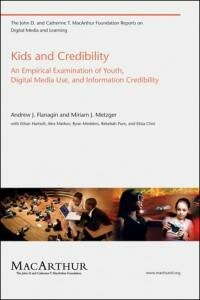
The MacArthur Foundation Reports on Digital Media and Learning, published by the MIT Press, present findings from current research on how young people learn, play, socialize and participate in civic life. How well, for example, do children navigate the ocean of information that is available online? The enormous variety of Web-based resources represents both opportunities and challenges for Internet-savvy kids. Kids and Credibility by Andrew Flanagin and Miriam Metzger reports on the first studies aimed at examining children’s online information-seeking strategies and their beliefs about the credibility of that information.
The book starts of with a rationale for studying the credibility of information delivered via digital media, especially regarding children, and describing the research approach in short. The core of the book, however, deals with the findings from the studies conducted by Flanagin and Metzger’s team.
The first part of the findings, regarding use of the Internet by children, set the stage for interpreting the following parts. First, the assessment of credibility is investigated. The distinction that is made between credibility assessments based on heuristic (e.g., relying on gut feelings), analytic (e.g., carefully considering the information), and social (e.g., getting advice from others) criteria is very much welcomed. This distinction gives more insight into how and when credibility assessments lead to trust development. Subsequently, differences between children and parents regarding their ability to evaluate the credibility of information online are described in detail.
The latter part of the findings adds upon the previous parts by moving from descriptive towards quasi-experimental research, thereby providing the opportunity to explore causalities regarding evaluation of information online.
The text is very accessible; both for a scholarly audience and students. Nevertheless, an in depth discussion of potential theoretical contributions of this work is still missing. Since this research is explorative in nature, however, the book provides an excellent overview of the state of the art.
Finally, the implications and future directions are described to a limited extent. Nevertheless, the wealth of information provides the reader the opportunity to draw conclusions regarding future research and practice regarding kids and credibility.

Add new comment